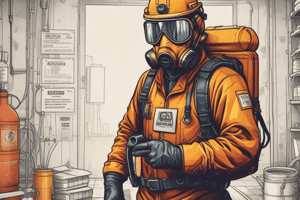Podcast
Questions and Answers
What scale is used to classify hazard severity?
What scale is used to classify hazard severity?
- Uses numbers from 0 to 4 (correct)
- Uses letters A to D
- Uses colors
- Uses symbols
What are the components of the Chemical Hazard Identification System?
What are the components of the Chemical Hazard Identification System?
Reactivity/Stability Hazard, Specific Hazard, Health Hazard, Fire/Flammability Hazard
What color represents the Reactivity/Stability Hazard?
What color represents the Reactivity/Stability Hazard?
Yellow
What color signifies a Specific Hazard?
What color signifies a Specific Hazard?
What color indicates a Health Hazard?
What color indicates a Health Hazard?
What color is used for Fire/Flammability Hazard?
What color is used for Fire/Flammability Hazard?
What does a 0 represent in the Reactivity/Stability Hazard scale?
What does a 0 represent in the Reactivity/Stability Hazard scale?
What does OXY stand for in specific hazards?
What does OXY stand for in specific hazards?
What does 0 indicate in the Health Hazard classification?
What does 0 indicate in the Health Hazard classification?
What does a rating of 4 under Flammability Hazard mean?
What does a rating of 4 under Flammability Hazard mean?
What does a 0 rating in the hazard index signify?
What does a 0 rating in the hazard index signify?
Do not operate equipment with wet hands.
Do not operate equipment with wet hands.
All electrical equipment is grounded in a _____ to avoid electric shock.
All electrical equipment is grounded in a _____ to avoid electric shock.
If electrical shock occurs, you should touch the person or the equipment involved.
If electrical shock occurs, you should touch the person or the equipment involved.
The first thing you do if someone is suffering from an electric shock is ______.
The first thing you do if someone is suffering from an electric shock is ______.
What steps should be taken when electrical shock occurs?
What steps should be taken when electrical shock occurs?
Flammable chemicals should be stored in Safety Cabinets and _____ in a remote area.
Flammable chemicals should be stored in Safety Cabinets and _____ in a remote area.
Study Notes
Hazard Classification
- Hazard severity is classified using a numerical scale from 0 to 4, where 4 indicates extremely hazardous materials.
Chemical Hazard Identification System
- Classifies hazards into four categories:
- Reactivity/Stability Hazard
- Specific Hazard
- Health Hazard
- Fire/Flammability Hazard
Hazards Color Coding
- Yellow: Represents Reactivity/Stability Hazard.
- White: Indicates Specific Hazard.
- Blue: Designates Health Hazard.
- Red: Signifies Fire/Flammability Hazard.
Reactivity/Stability Hazard Index
- Scale is as follows:
- 0: Stable
- 1: Unstable if heated
- 2: Violent chemical change
- 3: Shock and heat may deteriorate/detonate
- 4: May deteriorate/detonate
Specific Hazard Codes
- Codes for specific hazards include:
- OXY: Oxidizer
- ACID: Acid
- ALK: Alkali
- COR: Corrosive
- Additional note: Use no water and be aware of radiation hazards.
Health Hazard Index
- Scale includes:
- 0: Normal Material
- 1: Slightly Hazardous
- 2: Hazardous
- 3: Extreme Danger
- 4: Deadly
Flammability Hazard Index
- Scale includes:
- 0: Will not burn
- 1: Burns above 200°F
- 2: Burns below 200°F
- 3: Burns below 100°F
- 4: Burns below 73°F
Degree of Hazards (Hazard Index)
- Classifies materials based on hazard severity:
- 0: No or minimal hazard
- 1: Slight hazard
- 2: Moderate hazard
- 3: Serious hazard
- 4: Extreme/Severe hazard
Electrical Safety Precautions
- Avoid operating equipment with wet hands (True).
- All electrical equipment should be fitted with a 3-pronged plug for grounding to prevent electric shock.
- If electrical shock occurs, avoid touching the person or the equipment involved (False).
Emergency Response to Electric Shock
- Immediate actions when someone suffers electric shock:
- Turn off the circuit breaker.
- Unplug the equipment if safe to do so.
- Move equipment using a non-conductive material, such as glass or wood.
Storage of Flammable Chemicals
- Flammable chemicals must be stored in safety cabinets and explosion-proof refrigerators located in remote areas to minimize risk.
Studying That Suits You
Use AI to generate personalized quizzes and flashcards to suit your learning preferences.
Description
Test your knowledge on the classification of hazards, focusing on the chemical hazard identification system and severity scales. This quiz covers the color coding for different hazards and specific codes for identifying chemical risks. Get ready to enhance your understanding of chemical safety!




